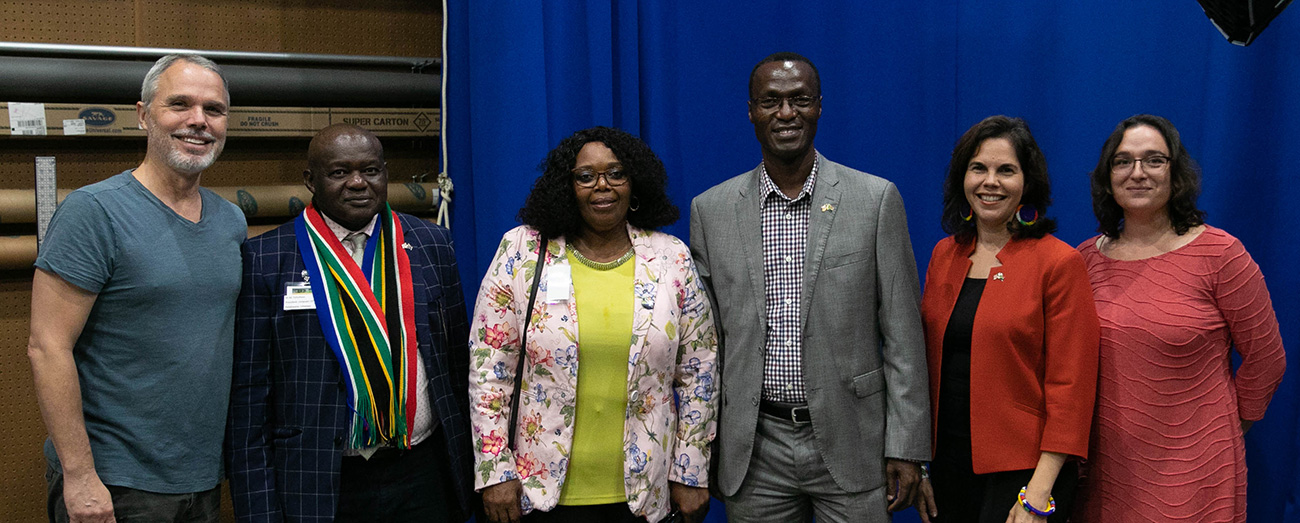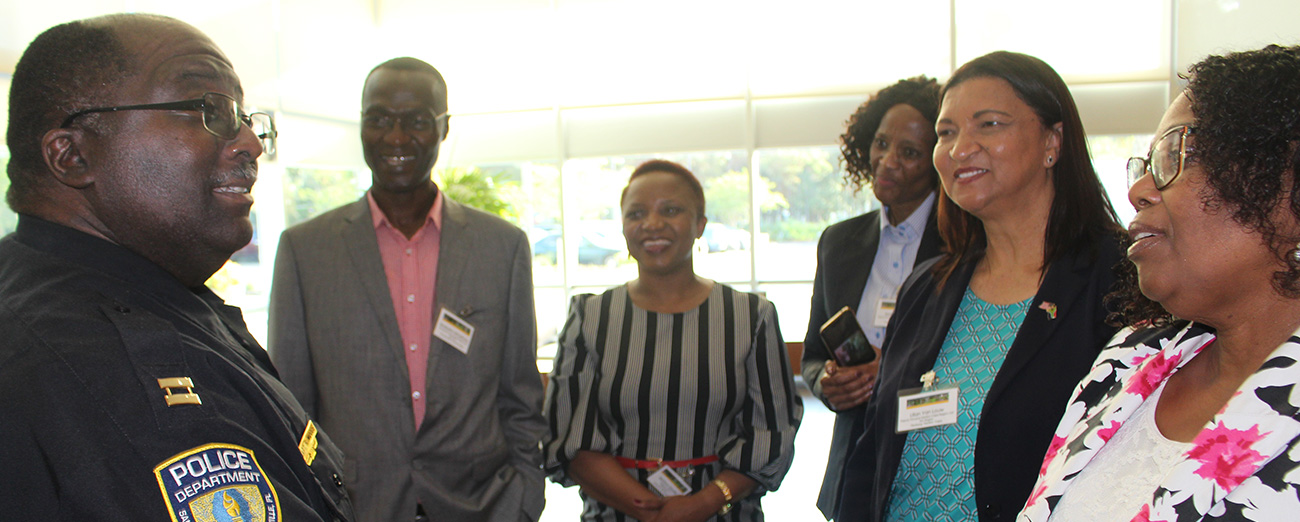South Africa
Overview
Santa Fe College hosted a delegation of sixteen higher education administrators from South Africa on October 14 - 25, 2019 as part of a six-week Community College Administrator Program (CCAP) funded by the United States Department of State. The CCAP with South Africa was administered by Florida State University with Santa Fe College as the lead community college partner. This program was intended to support South Africa in its continued path of reform, a reform it has engaged in for the past 25 years.
 In 1994, South Africa made a transition away from Apartheid and to democratic government.
Since then, the country has been challenged by several socio-economic factors. Over
50% of South Africans live below the national poverty line. Approximately 90% of the
country's poor are Blacks. Unemployment among the youth population (15 - 34 year old)
is 38.7% and unemployment overall hovers at 27%. There is a strong correlation between
education, unemployment and poverty: 76% of those who have completed higher education
are employed. Many of the Blacks who were raised in Apartheid South Africa never completed
or had limited access to schooling. As a result, 30% of South Africans ages 35 - 64
are illiterate.
In 1994, South Africa made a transition away from Apartheid and to democratic government.
Since then, the country has been challenged by several socio-economic factors. Over
50% of South Africans live below the national poverty line. Approximately 90% of the
country's poor are Blacks. Unemployment among the youth population (15 - 34 year old)
is 38.7% and unemployment overall hovers at 27%. There is a strong correlation between
education, unemployment and poverty: 76% of those who have completed higher education
are employed. Many of the Blacks who were raised in Apartheid South Africa never completed
or had limited access to schooling. As a result, 30% of South Africans ages 35 - 64
are illiterate.
 Education has been seen as the primary road for alleviating poverty and unemployment
in South Africa. In 2009, South Africa's Ministry of Labor was renamed the Ministry
of Education and Training. The Department of Higher Education and Training (DHET)
within this ministry was charged with overseeing technical vocational training. Historically
black and white college were merged beginning in 1998 to create 50 multi-campus TVET
college. These colleges were charged with giving students practical, employable skills
after high school.
Education has been seen as the primary road for alleviating poverty and unemployment
in South Africa. In 2009, South Africa's Ministry of Labor was renamed the Ministry
of Education and Training. The Department of Higher Education and Training (DHET)
within this ministry was charged with overseeing technical vocational training. Historically
black and white college were merged beginning in 1998 to create 50 multi-campus TVET
college. These colleges were charged with giving students practical, employable skills
after high school.
In 2013 South Africa passed legislation that provided the legal framework for the creation of community colleges. In 2015 the country's 3,276 community learning centers were merged into nine community colleges (also known as CET colleges). Unlike TVETs, the new community colleges were given the responsibility of providing basic education and training to adults who had received limited to no formal schooling. Given the scope of the task, DHET decided to pilot this new model through the creation of only nine community colleges, one in each of South Africa's nine provinces. At the heart of these community colleges is the goal of ensuring access to education in order to ensure a more equitable and just society. These new institutions will provide basic literacy courses, basic life skills courses, and academic programs that will help students gain basic workforce skills that will help them find employment.
 The CCAP for South Africa included 16 leaders from DHET, TVET colleges and CET (or
community) colleges. The delegation from South Africa benefited from a series of presentations
led by senior Santa Fe College administrators on issues related to governance, finance,
academic programs, workforce development and community service. In addition, they
participated in college classes, daily small group discussions and toured various
educational facilities. SF students were particularly enriched by this experience.
We invite you to listen to the podcast below featuring three South African CCAP participants:
The CCAP for South Africa included 16 leaders from DHET, TVET colleges and CET (or
community) colleges. The delegation from South Africa benefited from a series of presentations
led by senior Santa Fe College administrators on issues related to governance, finance,
academic programs, workforce development and community service. In addition, they
participated in college classes, daily small group discussions and toured various
educational facilities. SF students were particularly enriched by this experience.
We invite you to listen to the podcast below featuring three South African CCAP participants:
- Azwinndini Christopher Tshivashe, Principal of the Limpopo Region CET
- Bhekifini Sibusiso Vincent Mthethwa, Principal of the Kwazulu-Natal Region CET
- Noluthando Balfour, Principal of King Hintsa TVET College in Gauteng Province
Santa Fe College will be hosting a second delegation from South Africa in the Spring of 2024. Please read the U.S. Department of State's press release(Opens in new window) to learn more.
To view the transcript for any of our podcasts, please visit our media host's website(Opens in new window).